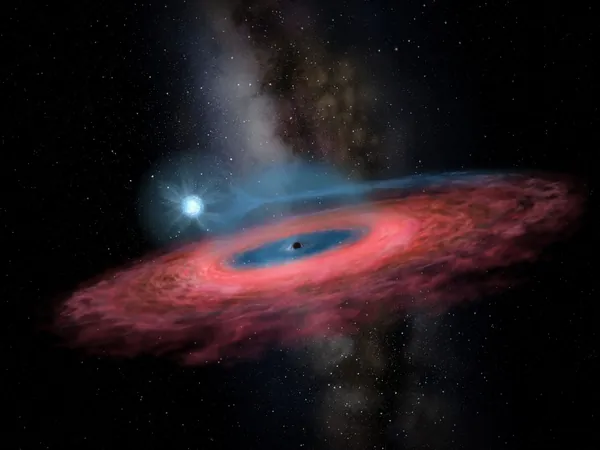
Scientists Break New Ground with Shocking Discovery of 'Negative Time' in Quantum Experiments
2024-12-23
Author: Yu
Scientists Break New Ground with Shocking Discovery of 'Negative Time' in Quantum Experiments
In a groundbreaking announcement, researchers from the University of Toronto have unveiled findings from their avant-garde quantum experiments that suggest the existence of "negative time"—a concept previously thought to be confined to theoretical discussions. This intriguing discovery is unlike anything witnessed before and has stirred global intrigue as well as skepticism.
According to the team, led by prominent physicist Aephraim Steinberg, these results spotlight a peculiar aspect of quantum mechanics rather than rewriting our foundational understanding of time itself. “This is tough stuff, even for us to talk about with other physicists. We get misunderstood all the time,” he noted.
At first glance, "negative time" might evoke imagery from a sci-fi narrative, but despite its curious nomenclature, Steinberg hopes it ignites substantial discussions surrounding the enigmatic principles of quantum physics.
The Mechanics Behind the Experiment
The research sprouted from prior investigations into light and matter interactions. The researchers employed advanced laser technology to observe the behavior of light particles, or photons, when they interacted with atoms. In these encounters, photons could be absorbed, causing the atoms to enter a "higher-energy" excited state, only to eventually emit the light again.
In a captivating twist, the experiments revealed that the duration these atoms remained in their excited state could yield a "negative" value—signifying a time frame less than zero. To help put this into perspective, Steinberg draws an analogy: envision a fleet of cars entering a tunnel with an expected entry time of noon, yet some cars exit slightly earlier, say at 11:59 AM. Such results, while seemingly nonsensical, were earlier brushed aside as irrelevant—until now.
Cracking the Code of Quantum Probability
What sets this research apart is its highly meticulous nature. The experiments took over two years to optimize, with researchers ensuring their laser systems remained perfectly calibrated to avoid any distorting influences on the data. However, it's essential to clarify that while the term "negative time" may conjure ideas of time travel, the researchers have no intention of suggesting that any entity travels backward through time.
“This isn’t about suggesting anything is traveling backward,” Steinberg clarified. The findings arise from the probabilistic—and often counterintuitive—behavior of quantum particles, where interactions between photons and atoms unfold across a spectrum of durations, many of which can stretch the limits of common understanding.
Crucially, this phenomenon doesn't contradict Einstein’s theory of special relativity, which holds that nothing can exceed the speed of light. As these photons did not carry any information, they neatly sidestep any cosmic speed boundaries.
A Controversial Yet Fascinating Finding
As anticipated, the emergence of "negative time" has ignited passionate debate within scientific communities. Renowned physicist Sabine Hossenfelder has criticized the implications of the term in a widely-viewed YouTube video, asserting that the term does not correlate with the concept of time passing but merely describes how light behaves in various media.
In the face of this skepticism, Angulo and Steinberg maintain that their research provides essential insights into why light does not consistently travel at a uniform speed, addressing unresolved questions in the field of physics. Steinberg acknowledged the controversial nature of their paper's bold assertion but emphasized that none of the experimental results have faced serious contestation among scientists.
Though commercial applications stemming from this discovery remain elusive, the researchers believe their findings could pave the way for a deeper understanding of quantum phenomena. As Steinberg candidly noted, “We’re going to keep thinking about it, but I don’t want to get people’s hopes up.” The quest for knowledge is far from over; it appears that the quantum realm is filled with mysteries just waiting to be unraveled!
Stay tuned as this captivating story develops—openness to challenges in the world of science might just unlock the next big breakthrough. Would this discovery prepare the ground for future technologies or even our understanding of the universe? Only time will tell!


 Brasil (PT)
Brasil (PT)
 Canada (EN)
Canada (EN)
 Chile (ES)
Chile (ES)
 Česko (CS)
Česko (CS)
 대한민국 (KO)
대한민국 (KO)
 España (ES)
España (ES)
 France (FR)
France (FR)
 Hong Kong (EN)
Hong Kong (EN)
 Italia (IT)
Italia (IT)
 日本 (JA)
日本 (JA)
 Magyarország (HU)
Magyarország (HU)
 Norge (NO)
Norge (NO)
 Polska (PL)
Polska (PL)
 Schweiz (DE)
Schweiz (DE)
 Singapore (EN)
Singapore (EN)
 Sverige (SV)
Sverige (SV)
 Suomi (FI)
Suomi (FI)
 Türkiye (TR)
Türkiye (TR)
 الإمارات العربية المتحدة (AR)
الإمارات العربية المتحدة (AR)